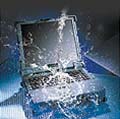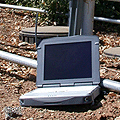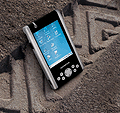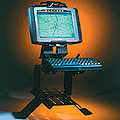|
Case Studies
Using existing investments for managing smartphones and mobile devices in the field
by David Yeaple
Considerable investments are being made in a growing number of corporations today on products that enable the enterprise helpdesk and IS departments to manage and maintain company resources. These management products - servers, desktops, laptops, applications, and networks - ensure that enterprise resources like mobile devices and smartphones consistently function correctly. Methods such as remote control, asset hardware/software reporting and automated provisioning of updates are being employed in order to manage such resources and effectively troubleshoot, diagnose and repair machines in the field.
Addressing the Issues
The advent of sophisticated mobile devices such as Windows Mobile Smartphone and Pocket PC handhelds has added a new element into the enterprise and a unique set of management requirements. While these devices can enable mobile workers to remotely access e-mail and mission critical line-of-business applications such as CRM, ERP, and Field Service applications, their available memory, computing horsepower, and battery life are constrained by the devices' required form factors for handheld operation. Unlike desktops and servers on corporate networks, these devices are often remotely connected to the enterprise by a variety of wired and wireless connections. These remote connections may not always be available and may be slow due to limited bandwidth or network congestion. The distributed nature of these devices, combined with their mission critical use, makes the enterprise requirements for their management even greater.
In the past, software companies have dealt with these management challenges with proprietary, stand-alone products. These products utilize client software on the mobile device that is designed to only communicate with their own enterprise console and server. Often not uniquely designed around the constraints of mobile devices, the client software negatively impacts the performance of the device for the mobile user by consuming significant amounts of the device's memory, computing, and power resources. Moreover, because these products are also designed to support less sophisticated mobile device platforms, their management feature set for Windows Mobile devices is constrained to the capabilities of the least sophisticated mobile device platform - eliminating critical features such as live, interactive remote control.
Open-Standards-Meeting the Requirements
Today, rather than investing in stand-alone, proprietary mobile device management products, leading companies are looking to leverage their significant investments in enterprise management products to also manage their Windows Mobile Smartphone and Pocket PC devices. While some of these leading enterprise management software providers have recently made incremental enhancements to their products' support of Windows Mobile devices, the feature set needed to comprehensively meet enterprise management requirements for these devices is still largely unmet.
The good news, however, is that many of the leading enterprise management software providers have included open standards-based communications interfaces to their management consoles and servers (such as support for XML SOAP Web Services) so that other third party software companies can integrate their own value-added functionality directly into these products.
Execute Correctly = Lower Impact
Executed correctly, a third party on-device management agent can directly leverage the inherent enterprise security, scalability and reliability of the enterprise management product. The on-device agent communicates directly with the enterprise management product's server, database, and console through these open standards-based communication protocols, so that IS and helpdesk personnel can comprehensively mange their entire enterprise, including remote Windows Mobile devices, from a "single pane of glass". In this approach, it is critical that the third party on-device agent be optimized for operation across low bandwidth or congested network connections.
Management features enabled by a third party on-device agent can include fully automated provisioning and installation of updates over any wired or wireless connection; live interactive access to remote devices including remote control; live access to on-device processes, the device registry, file system, network adapters and other on-device functions; and detailed asset hardware/software/heath reporting directly into the enterprise management product's database. In addition, if the third party on-device agent has been specifically designed for management of Windows Mobile devices, the agent can maximize the available management capabilities by leveraging specific Windows Mobile operating system features, that aren't available on other mobile platforms - thereby enabling the agent to offer an extremely rich set of management features without impacting device performance for the mobile user.
Higher ROI- Consider Third Party
Increasing ROI - and the productivity of both field workers and the help desk - is being accomplished by the use of third party applications in corporations everywhere. By more fully using the capabilities of existing enterprise resources for mobile device management, corporations everywhere are continuing to grow and accelerate. Over the past year alone many leading companies and government organizations have used these third party solutions to manage thousands, or even tens-of-thousands, of Windows Mobile devices in their respective enterprises with excellent ROI and productivity gains.
David Yeaple is a Technical Evangelist for Odyssey Software, Inc., a provider of mobile device management solutions for Windows Mobile devices. Odyssey Software's Athena product is used for comprehensive management of Windows Mobile Smartphone and Pocket PC devices, and Windows CE devices, in conjunction with enterprise management products such as Microsoft Systems Management Server 2003. David holds a BSEE from Rochester Institute of Technology and an MBA from Oregon State University. He has been with Odyssey Software for over seven years and can be reached at dyeaple@odysseysoftware.com.
|


































